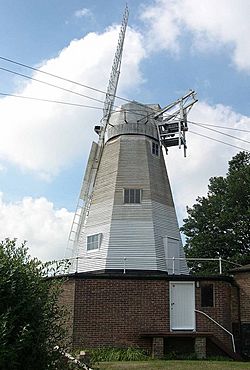Blackdown Mill, Punnetts Town facts for kids
Quick facts for kids Punnetts Town Windmill |
|
|---|---|

The mill in 2006
|
|
| Origin | |
| Mill name | Punnett's Town Mill Cherry Clack Mill |
| Mill location | TQ 627 209 |
| Coordinates | 50°57′54″N 0°18′58″E / 50.965°N 0.316°E |
| Operator(s) | Private |
| Year built | 1859 |
| Information | |
| Purpose | Corn mill |
| Type | Smock mill |
| Storeys | Three-storey smock |
| Base storeys | Single-storey base |
| Smock sides | Eight sides |
| No. of sails | Four Sails (Two Missing) |
| Type of sails | Common sails |
| Windshaft | Cast iron |
| Winding | Fantail |
| Fantail blades | Six blades |
| Auxiliary power | Engine |
| No. of pairs of millstones | Two pairs, a third pair driven by engine |
The Punnetts Town Windmill, also known as Blackdown Mill or Cherry Clack Mill, is a special type of windmill called a smock mill. It's located in Punnetts Town, East Sussex, England. This old mill is a Grade II listed building, which means it's an important historical site. It has been carefully fixed up and restored.
Contents
The Mill's Journey: From Kent to Sussex
The Blackdown Mill wasn't always in Punnetts Town. It was first built in a place called Three Chimneys in Cranbrook, Kent.
In 1859, it was taken apart and moved piece by piece to Punnetts Town. It replaced an older windmill, a post mill, that had burned down. Before the move, in 1851, the mill was called Cherry Clack Mill. A miller named Demas Dallaway worked there.
A company called Neve's, who were expert millwrights from Heathfield, handled the big move. The windmill used wind power to grind grain until the 1920s. Then, a broken part called a curb stopped the mill from turning into the wind.
In 1933, Neve's removed the mill's machinery, its top (cap), and its sails. The mill could no longer work.
Bringing the Mill Back to Life
In 1946, a man named Archie Dallaway decided to restore the mill. He wanted it to work again. A new cap was built for the mill. This new cap looked different from the original one.
A new fantail was added. This part helps the mill turn to face the wind. The main shaft, called a windshaft, from another mill was installed. This other mill, called Staplecross Mill, was taken down in 1951.
In 1972, four new sails were made and put onto the windmill. Two sets of millstones were also put in. One set came from a watermill in Polegate. Later, a third set of stones was added.
How the Windmill Works
The Blackdown Mill is a smock mill. It has three main levels on top of a single-story brick base. Smock mills look a bit like a farmer's smock (a loose shirt).
Originally, the mill had a special top, or cap, that was common in Kent. A fantail helped it turn to face the wind. When it was last used for grinding grain, it had four patent sails. These sails could adjust automatically.
The mill used to power two pairs of millstones. These stones ground grain from above. A third pair of stones could be powered by an engine. The mill could also power a saw.
Modern Features and Challenges
Today, the restored mill has a different cap. It's shaped like a beehive and covered in aluminum. The sails are now "common sails," which are simpler than patent sails.
Each sail is about 26 feet 6 inches (8.08 meters) long and 5 feet 3 inches (1.60 meters) wide. The cap turns with a fantail that is 6 feet (1.83 meters) across.
Inside, a strong cast-iron windshaft holds an 8-foot 4-inch (2.54-meter) wide oak brake wheel. This wheel turns a cast-iron wallower, which is on a tall, upright shaft. The great spur wheel, which helps turn the millstones, was replaced by Mr. Dallaway.
Three pairs of millstones are still used to grind grain from above. Recent pictures show that the mill is missing two of its sails and its fantail. In 2016, strong winds caused damage, breaking the new mast and setting back the restoration work.
Millers of Punnetts Town Windmill
- Samuel Dallaway 1859 - 1876
- Dallaway Brothers (Charles, Thomas and John) 1876 - c.1910
- Demas Dallaway 1910 - 1933
- Archie Dallaway 1946 -
 | Isaac Myers |
 | D. Hamilton Jackson |
 | A. Philip Randolph |

